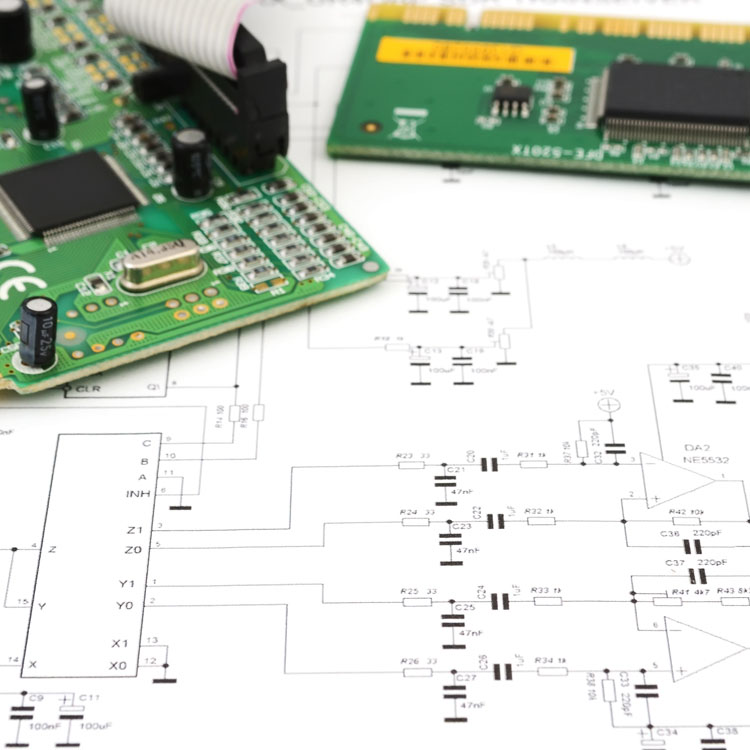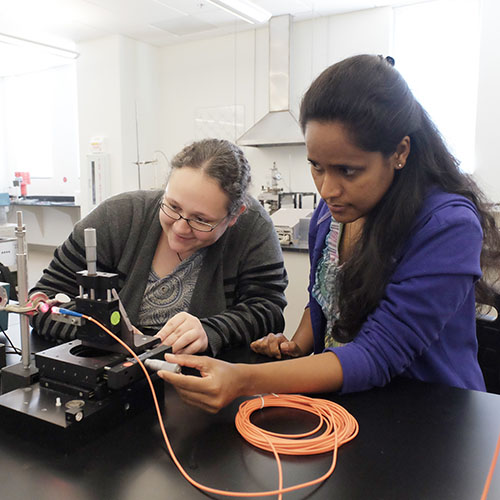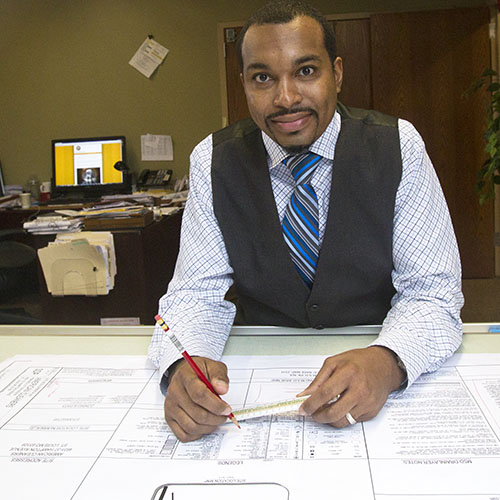An electrical engineering degree with all the benefits of two schools
Electrical engineers make the world go round – they play an integral part in power generation, electronics development, telecommunications and so much more.
A Bachelor of Science in Electrical Engineering (BSEE) from the Joint Engineering Program at the University of Missouri–St. Louis prepares you to become one of the important professionals creating the electrical infrastructure we depend on every day.
This BSEE degree stands out for its unique format that gives you the best of two electrical engineering schools – UMSL and Washington University in St. Louis. For UMSL tuition plus a small fee, you can take your foundational courses at UMSL and your upper-level engineering classes in WashU’s prestigious engineering department.
The Bachelor of Science in Electrical Engineering (BSEE) is accredited by the Engineering Accreditation Commission of ABET, www.abet.org, under the General Criteria and the Electrical Engineering Program Criteria.
A BSEE degree for any type of student
Our bachelor’s degree in electrical engineering is suitable for students at all stages of life – from those who have yet to enter the workforce to professionals looking for a career change.
Whether you’re a full-time or part-time student, classes for this electrical engineering degree are held in the late afternoon or evening, making it possible to maintain work, internship or co-op responsibilities. That means every student has plenty of time and opportunity to complement their coursework with industry experience.
Program type:
Major, BSEE
Format:
On-Campus, 100% Evenings
Take the next step
Request more information below:

Why earn your electrical engineering degree at UMSL?
A bachelor’s degree in electrical engineering from the Joint Engineering Program at UMSL stands out by being:
- ABET accredited. This electrical engineering degree is accredited by the Accreditation Board for Engineering and Technology.
- Taught by experienced faculty. The majority of the faculty you’ll learn from are professional engineers with real-world expertise.
- Affordable. Exceptional value for access to two universities.
- In partnership with Washington University. WashU is a prestigious electrical engineering school, and you’ll have access to its faculty, labs, libraries and more.
- Conveniently scheduled. Complete coursework for your BSEE degree in the evenings so you have all day to work or intern.
- Located near internship opportunities. St. Louis is a hub of industry, and staff at both UMSL and WashU can place you in internships that can prepare you for a successful career.
What can you do with an electrical engineering degree?
Graduates with a bachelor’s degree in electrical engineering find employment in a variety of industries. Perhaps most obvious is power generation, but BSEE degrees also get you essential roles in manufacturing, electrical product development, telecommunications network management and more.
Companies hiring people with electrical engineering degrees include engineering firms, manufacturing companies, telecommunications services and even government agencies. Over 95 percent of our graduates are either employed or pursuing a graduate degree, and many of our graduates find employment right here in St. Louis.
109,010
5
Career Opportunities
- Communication Networks
- Defense and Aerospace Electronics
- Energy Generation and Distribution
- Motor and Actuator Development
- Security Systems
Program Educational Objectives
The objectives are to:
-
Meet the expectations of employers of electrical engineers and acquire the professional experience necessary for career advancement.
-
Pursue higher learning and advanced knowledge to adapt to evolving technologies and needs of the world.
- Actively engage with communities to account for societal impacts with high ethical standards.
Student Outcomes
Upon completion of the program, graduates will have an ability to:
-
identify, formulate, and solve complex engineering problems by applying principles of engineering, science, and mathematics;
-
apply engineering design to produce solutions that meet specified needs with consideration of public health, safety, and welfare, as well as global, cultural, social, environmental, and economic factors;
-
communicate effectively with a range of audiences;
-
recognize ethical and professional responsibilities in engineering situations and make informed judgments, which must consider the impact of engineering solutions in global, economic, environmental, and societal contexts;
-
function effectively on a team whose members together provide leadership, create a collaborative and inclusive environment, establish goals, plan tasks, and meet objectives;
-
develop and conduct appropriate experimentation, analyze and interpret data, and use engineering judgment to draw conclusions, and
-
acquire and apply new knowledge as needed, using appropriate learning strategies.
Plan of study
A program of 124 semester hours is required for the Bachelor of Science in Electrical Engineering.
-
Majors must complete the University General Education and Graduation requirements, the Pre-Engineering Requirements, the Core Engineering Requirements, and Major Requirements.
-
Majors must first complete JE MATH 3170, Engineering Mathematics, with a minimum grade of C-.
-
Majors must also complete JE ENGR 2300, Introduction to Electrical Networks, with a minimum grade of C-.
-
A minimum grade of C- is necessary to meet the prerequisite requirement for any course.
General Education Requirements
The following courses fulfill general education and graduation requirements and are required of Electrical Engineering majors:
| PHIL 2259 | Engineering Ethics | 3 |
| PHIL 3380 | Philosophy of Science | 3 |
| HIST 1001 OR HIST 1002 |
American Civilization 1865 to Present (MOTR HIST 102) | 3 |
| Three Additional Science Courses 1 | 9 | |
Total Hours |
18 |
|
| 1 One Social Science course must satisfy the Cultural Diversity Requirement. Humanities and social sciences electives must meet both the University of Missouri—St. Louis General Education Requirements and the Humanities and Social Sciences Requirements of the Joint Undergraduate Engineering Program. Check with your advisor for details. | ||
Pre-Engineering Requirements
Students seeking to major in engineering are first designated as ‘Undeclared with an interest in Engineering majors’ until they have completed Math 1800 Analytical Geometry & Calculus I. Upon successful completion of Math 1800 with a grade of C or better, students will be allowed to declare pre-engineering as their major. Math 1800 must be completed successfully within two attempts.
| MATH 1800 | Analytic Geometry and Calculus I | 5 |
| MATH 1900 | Analytic Geometry and Calculus II | 5 |
| MATH 2000 | Analytic Geometry and Calculus III | 5 |
| MATH 2020 | Introduction to Differential Equations | 3 |
| CHEM 1111 | Introductory Chemistry I (MOTR CHEM 150L) | 5 |
| PHYSICS 2111 | Physics: Mechanics and Heat | 4 |
| PHYSICS 2111L | Mechanics and Heat Laboratory | 1 |
| PHYSICS 2112 | Physics: Electricity, Magnetism, and Optics | 4 |
| PHYSICS 2112L | Electricity, Magnetism, and Optics Laboratory | 1 |
| ENGR 2310 | Statics | 3 |
| ENGR 2320 | Dynamics | 3 |
| ENGL 1100 | First-Year Writing (MOTR ENGL 200) | 3 |
Total Hours |
42 |
|
Engineering Core Requirements
| CMP SCI 1250 | Introduction to Computing | 3 |
| J E COMM 2000 | Engineering Studio I | 1 |
| J E MATH 3170 | Engineering Mathematics | 4 |
| ENGL 3130 | Technical Writing | 3 |
Total Hours |
11 |
|
Electrical Engineering Major Requirements
| Math 1320 | Introduction to Probability and Statistics | 3 |
| J CMP SC 1002 | Introduction to Computing Tools: Matlab Skills | 1 |
| J E ENGR 2320 | Introduction to Electronic Circuits | 3 |
| J E ENGR 2300 | Introduction to Electrical Networks | 3 |
| J E ENGR 2600 | Introduction to Digital Logic and Computer Design | 3 |
| J E ENGR 3300 | Engineering Electromagnetic Principles | 3 |
| J E ENGR 3320 | Power, Energy and Polyphase Circuits | 3 |
| J E ENGR 3510 | Signals and Systems | 3 |
| J E ENGR 4350 | Electrical Energy Laboratory | 3 |
| J E ENGR 4410/J M ENGR 4310 | Control Systems I | 3 |
| J E ENGR 4980 | Electrical Engineering Design Projects | 3 |
| J E ENGR 4990 | Electrical Engineering Senior Seminar | 1 |
| J M ENGR 3200 | Thermodynamics | 3 |
| Lab Courses | 6 | |
| Choose two of the following courses: | ||
| J E ENGR 2330 | Electrical and Electronic Circuits Laboratory | |
| J E ENGR 3310 | Electronics Laboratory | |
| J E ENGR 4470 | Robotics Laboratory | |
| Electrical Engineering Electives 3000-4990 | 12 | |
Total Hours |
53 |
|
All majors must meet the general education requirements of the university in addition to completing degree-specific curriculum requirements.4
Review Full Degree Requirements Review Sample Four-Year Plan
Non-Missouri Residents: Prospective students are responsible for reviewing the UMSL state authorizations page to see if this program is offered in their state throughout their program and to review the licensure or certification requirements for the state in which they reside.
| Academic Year | Enrollment | Graduates |
|---|---|---|
| 2018-2019 | 96 | 20 |
| 2019-2020 | 105 | 32 |
| 2020-2021 | 89 | 27 |
| 2021-2022 | 76 | 21 |
| 2022-2023 | 64 | 17 |
| 2023-2024 | 67 | 17 |
Student organizations
Make new friends and learn new skills by joining one of our Recognized Student Organizations. Here are several opportunities you may be interested in as an electrical engineering major:
- Society of Future Engineers
- Student Government Association
- Students of the University of Missouri
Networking Opportunities
Meet local professionals and enrich your experience through the Society of Future Engineers Speaker Series.
You can also network through our mentorship program, which pairs undergraduates with mentors in the industry, many of whom are alumni.
Honors College
The UMSL Honors College is a certificate program that can be paired with any major without adding extra classes or extending time to graduate. Classes in the Honors College are seminar-style, meaning that they are based in reading, writing, discussion, and critical thinking. This unique class format fosters an intellectual climate centered around democracy, diversity, civility and academic excellence.
Undergraduate research
We encourage and support students as they engage in exciting activities in and outside of the classroom that enrich their academic and professional understanding of their chosen area of study. All majors are encouraged to participate in Undergraduate Research and Scholarship to produce discipline-specific intellectual or creative innovations to their field.








